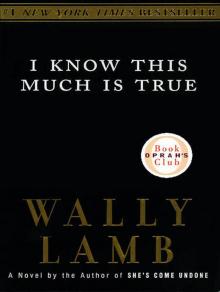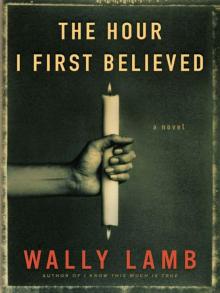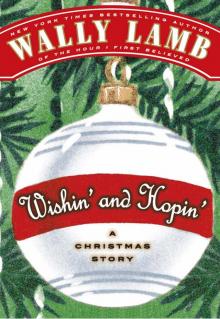- Home
- Wally Lamb
The Hour I First Believed Page 5
The Hour I First Believed Read online
Page 5
“Oh,” she said. “So was I the one who just brought him up?”
VELVET AND I BEGAN OUR sessions by examining “Guerrilla Grrrrl.” She said it was neither a parody nor a reflection of herself; it was just some stupid story she’d made up because she had to. No, she didn’t want to revise it. With deep sighs of disgust, she fixed the spelling and run-on sentences and declared the job done. In the next few weeks, I gave her two more writing assignments. For each, she wrote variations on the first story.
She was a reader, so there was that to build on. During one of our early go-arounds, I asked her what kind of books she liked. “I don’t know,” she said. “Different kinds. But not that Shakespeare shit.”
“So what’s your favorite book?” I asked. I was grasping, frankly. A dialogue between “buddies” is tough when you’re the only bud who’s talking. Velvet answered my question with an indifferent shrug. So I was pleasantly surprised when, the next day, she took a Chiclet-sized piece of paper out of her back pocket, unfolded and unfolded it, and handed it to me. “These are my top four,” she said. “I like them all the same.” She had scrawled fifteen or sixteen book titles and crossed out all but Dune, Interview with the Vampire, The Hitchhiker’s Guide to the Galaxy, and To Kill a Mockingbird. I told her that Mockingbird was one of my favorites, too. She nodded soberly. “Boo Radley rocks,” she said.
That weekend, in Denver, I wandered into the Tattered Cover. I’d meant to browse for myself. Instead, I filled my arms with books for Velvet.
She read them, too: Tolkien, Ursula K. Le Guin, H. G. Wells. She balked at Dickens at first, but after she’d read everything else, she picked up Great Expectations. “I thought this was gonna suck, but it doesn’t,” she told me, halfway through the book. “This dude gets it.”
“Gets what?” I said.
“All the different ways adults fuck with kids’ heads.”
It was a pretty perceptive observation, but her jailer, Mrs. Jett, heard the f-bomb and approached, pointing to a hand-lettered sign on the wall titled “The Ten Commandments of In-School Suspension.” The woman had actually cut cardboard into the shape of Moses’ stone tablets. She stared hard at Velvet, her pencil point tapping against Commandment Number Five, “Thou Shalt Not Use Profanity.”
Goddamnit, I thought. Back off. Let the kid breathe. “Hey, let me ask you something,” I said. “Did you have to climb into the Rockies and pick that up personally, or did God the Father FedEx it to you?”
“Whoa, dude! He just iced her!” a kid in another cubicle announced. Mrs. Jett’s chin quivered. She asked to speak to me in the hallway.
“I don’t appreciate your sarcasm,” she said. I told her I didn’t appreciate her eavesdropping. “I don’t have to eavesdrop, Mr. Quick. When you and Miss Hoon are having your lunchtime tête-à-têtes, we can all hear you plain as day.”
“Yeah, first of all, it’s Quirk, not Quick,” I said. “And they’re not tête-à-têtes. They’re literary discussions.” If she wanted to get on her high horse, I figured, then I sure as hell could climb up on mine.
“I don’t consider the word I heard her use to be ‘literary.’ Nor do I appreciate your casual attitude about my standards. I’d like you to consider the fact that you’re a guest in my classroom.”
“So this is a turf thing?” I said.
“No, sir. This is an education thing. I work with children who are largely in the dark about the rules of acceptable social behavior. Now I may not be as well-versed in lit’rature as you are, but I can certainly guide them in decency.”
“Lady,” I said. “Loosen up.”
When I returned from the hallway, Velvet slipped me a note. “That rocked!” it said. “She’s a fucken bitch.” And that, more than the books, was our big breakthrough.
I began signing Velvet out of jail at lunchtime. We’d swing by the nurse’s office first, so that she could take her asthma medicine and pick up the bag lunch Maureen had started bringing in for her. Then we’d head down to the English wing.
I started letting Velvet borrow my books: Vonnegut, Kesey, Pirsig, Plath. One morning, I took my prize possession out of our bookcase, dropped it into a Ziploc bag, and brought it in to school.
“It’s a first edition,” I said. “And look. She signed it.”
Velvet ran her finger over Harper Lee’s signature. “Dude,” she said. “This is a fake.”
“No, it isn’t. I bought it from a reputable dealer. It’s authenticated.”
“Whatever that means, it probably don’t mean dick,” she said.
“Dude,” I said. “Watch your language.” She kept touching the signature, staring at it in disbelief.
Ivy popped in one day after school. “Looks like things are going well with Velvet,” she said. “I walked by at lunchtime today and you two were deep in conversation. I almost didn’t recognize her without the scowl.”
“Yeah, the glacier’s starting to melt a little,” I said. “She’s bright.”
Ivy smiled. “One suggestion, though, Red Sox. Keep your door open.”
“Because?”
“Because kids like Velvet can manipulate situations. And people. It’s one of the ways they learn how to survive.”
“Look,” I said. “I’ve been teaching for twenty years. I’ve seen plenty of kids play plenty of teachers, but I’ve never been one of them, okay? So unless you want to tell me how she’s manipulating me—”
“I’m not saying she is, Quirk. I think you’re doing a great job with her. All I’m suggesting is that you leave your door open.”
Our conversation left a bad taste in my mouth. Wasn’t she the one who’d set up this “faculty buddy” thing? Wasn’t she the one who’d gotten all revved up about the idea of Velvet trusting a male teacher? Now that the kid was moving in that direction, it was a problem? I did leave the door open for the next few sessions, and it was hallway racket and one interruption after another. “Hey, Mr. Quirk, you busy?” “Yo, Mr. Quirk, what’s happening?” So I started closing it again, and locking it. I suggested we sit at the back of the classroom where no one would bother us.
Writing-wise, I wanted to wean Velvet away from those comic-book plots she kept cooking up, so I bought her a copy of Anne Lamott’s Bird by Bird: Some Instructions on Writing and Life. Velvet’s conclusion was that Lamott was “pretty wacked but pretty cool.” She reread the book, underlined her favorite parts, Post-it-noted pages. “No offense,” she said, “but too bad she’s not my teacher.” By the third week, her copy was held together with rubber bands, and Velvet had started writing about her life.
She steered clear of the really tough stuff—her parents, the foster home horrors—but what she wrote was still pretty compelling. She had this tough-vulnerable voice, you know? And an instinct about detail. She wrote this one piece about running away, and it was you getting into those cars that pulled over to the side of the road. It was you sitting in those Wal-Mart snack bars, waiting for folks to get up and walk away from their half-eaten food rather than tossing it. I don’t mean to overstate it. She wasn’t a genius or anything. But for better or worse, she’d lived more—suffered more—than most kids, so she had more to draw on. Reflect on. And she’d take feedback and run with it. Come back with a revision twice as good as her first draft. And damn if that wasn’t a rush.
One day, I asked Velvet to write about her favorite place. “My favorite place now or ever?” she asked.
“Ever,” I said.
The following Monday, she handed me an essay titled “Hope Cemetery.” I asked her where it was. “Near my grandmother’s house in Vermont,” she said. “I used to go there to think and shit. I couldn’t make it come out like I wanted. If you don’t like it, just rip it up.”
I’d been telling Velvet to grab the reader’s attention from the beginning, and “Hope Cemetery” sure accomplished that. It opened with her fitting a condom over some kid’s dick. During her second try at living in harmony with Grandma, Velvet had begun giving blow jobs behind a
mausoleum at the back of the graveyard, ten bucks a pop. I stopped reading. Put the paper down and walked away from it. Was she starting to trust me too much? Was she playing Shock the Teacher?
But I sat back down and kept reading, and after the raunchy opening, “Hope Cemetery” took an unexpected turn. Became a meditation on Velvet’s grandfather, a stonecutter whom she knew only from his graveyard sculpture. (Later on, I Googled the guy. Three different hits verified that Angelo Colonni had been more artist than artisan, one of the best of the breed.) Velvet describes the change Hope Cemetery triggers in her. She stops doing business there and starts going, instead, to visit her grandfather’s art: floral bouquets, weeping angels, replicas of dead children, all of them released from blocks of granite. The essay ends back at her grandmother’s garage, where Velvet handles the chisels, mallets, and rasps that Colonni had used. In the last sentence, she slips one of her hands inside her grandfather’s battered leather work glove. And with that simple act, she feels a connection across time that’s both tactile and spiritual. It was a poignant piece of writing, better than she knew. I told her so.
She said she thought it kind of sucked.
“Well, it doesn’t,” I said. “Look, the Colorado Council of the Arts is sponsoring a writing contest for high school kids. The winners get cash awards. You should work on this some more and enter it. I think you’d have a shot.”
She snorted. Some snobby rich kid would win, she said; it would be a waste of time and stamps.
“Guess that lets you off the hook then,” I said. “Pretty convenient.”
“Should I take out the beginning?” she asked. “If I enter that contest, or whatever.”
I said I wasn’t sure. “It’s pretty raw. Might be off-putting to some straitlaced judge. But there’s a strange resonance between the beginning and the end. The glove thing, you know?”
“What’s resonance?”
“It’s like when something echoes something else and…deepens it. Makes it mean something more than it meant at first. See, there’s the initial effect of you putting the condom on the nameless boy, and it’s strictly business, right?”
“Those guys were douchebags,” she said.
“Yeah, well…but at the end, when you slip your hand into your granddad’s glove, it’s a loving act. So from the beginning of the essay to the end, you’ve changed, see? And it’s the sculpture that took you there. You get it?”
She nodded.
“So, to answer your question, it’s up to you whether or not you want to leave the opening image in or take it out.”
“Yeah, but what do you think I should do?”
“I think you should figure it out for yourself. You have good writing instincts. Use them.”
At the end of that session, she thanked me for my help. First time. “You know a lot about writing,” she said. “You should write a book.”
I told her I had—a novel.
“Shut up! Did it get published?”
“It was accepted for publication, but then it never happened.”
“Why not?”
“Long story.”
“What’s it about?”
The disappearance of a little boy, I told her.
“Cool. Can I read it sometime?”
“No.”
“Has Maureen read it?”
“Mrs. Quirk, you mean? No, she hasn’t.”
“Why not?”
Because it made me too vulnerable. “Because it’s asleep in a file cabinet in Connecticut,” I said. “I don’t want to wake it up.”
She smirked at that. “So now you don’t have to work on it no more, right?” I told her I was beginning to feel like I’d created a monster.
“What’s the title?”
“Hey,” I said. “Let’s get back to your writing.” But she persisted. Pestered me until I told her. “The Absent Boy,” I said.
She repeated the title, nodding in agreement. “Cool,” she said.
On our walk back to the in-school suspension room, I brought up the subject of those graveyard blow jobs. “You’re not doing anything like that now, are you?” I asked. She looked away. Shook her head. “Because that’s pretty risky behavior, you know? You deserve better.”
“I made them use a condom,” she said.
“Which was good. But still—”
“Except this one older dude. He wouldn’t use one, so I charged him extra. Plus, he worked at Radio Shack, so he used to boost me some cool stuff. Handheld video games and shit.”
A FEW DAYS LATER, VELVET handed me a revision of “Hope Cemetery.” The sex act was intact, but she’d sanded down the rough edges and sharpened the connection between the opening and closing images. She’d grasped the concept of resonance, all right. At the bottom of her paper, I wrote, “This essay is as polished as one of your grandfather’s sculptures.” Sitting across from her at lunchtime the next day, I watched her read the comment. When she was done, she looked up, expressionless. She stared at me for a few seconds more than felt comfortable.
That night, I had Maureen read Velvet’s essay. “It’s unbelievable, isn’t it?” I said. “I mean, unless Jerry Falwell’s the judge, how could she not win this thing?…What? Why are you smirking?”
“Sounds like Mr. Neutral’s misplaced his objectivity,” she said.
“Yeah, well…if some kid comes up with a piece that’s better than ‘Hope Cemetery,’ I’d really like to read it.”
VELVET’S SIXTEENTH BIRTHDAY WAS COMING up, so we invited her over to the house for dinner. It was Maureen’s idea. I felt a little iffy about it—mixing school and home—but it wasn’t as if anyone else was going to do anything for the kid. Mo ordered a cake and one of those balloon bouquets. She made a vegetable lasagna. We shopped together for Velvet’s presents: dangly earrings, jazzy socks, a leather-bound journal for her writing.
Velvet wanted to be picked up in front of Wok Express, the takeout place near where the State of Colorado rented her a room. Mo drove over there, waited half an hour, and then called me. “Should I just come home?” she asked. “Oh, wait a minute. Here she comes.”
Back at the house, things got off to a bumpy start. Velvet took one look at Sophie and Chet and headed for higher ground—her butt on the back of our sofa, her big silver boots on the seat cushions. She’d been bitten by a rottweiler once, she said; she didn’t trust any dogs. We kept trying to convince her that ours were friendly, but she wasn’t buying it. I had to put them out in the garage and let them bark.
And then there was Velvet’s party outfit: cargo shorts, fishnet stockings crisscrossing the uncovered swastika tattoo, and a stained T-shirt with a cartoon picture of Santa Claus raising his middle finger. “Fuck You and the Sleigh You Rode In On,” it said. Maureen handled the situation gracefully. She asked Velvet if she wanted a house tour. On their way upstairs, I heard Mo suggest how chilly it was at our house. When they came back down again, the kid was wearing Mo’s blue pullover sweater.
We’d planned to have her open her gifts after dinner and birthday cake, but the minute she saw them, she tore into them. She put on her new earrings, pulled off her boots so that she could wear her new socks. She kept picking up the journal and rubbing its soft leather against her cheek.
“This dinner’s good, Mom,” Velvet told Maureen, even though she performed an autopsy on her square of lasagna, piling all traces of vegetable matter onto the cloth napkin beside her plate. Two or three times, she got out of her chair to whack her balloon bouquet. When we lit the candles and sang “Happy Birthday,” she wouldn’t look at her cake. She blew out her candles with such ferocity, I thought the frosting might fly across the room.
When Velvet went outside for a smoke, Maureen and I cleared the table. “This is going well, don’t you think?” Mo said.
“Uh-huh. She calls you Mom?”
“She just started doing that. I don’t think anyone’s ever had a party for her. Do you?”
“From the way she’s behaving, I’d say no. Do
you think we can let the dogs back in? They’re going crazy out there.”
Mo shook her head. “She’s really scared of them.”
We ended things a little after nine. Mo stayed home to clean up and I drove Velvet back, the balloons bobbing and blocking my view from the rearview mirror. En route, I asked her if she’d had a good time.
“Yeah,” she said. “You and Mom are awesome.”
“Why do you call her Mom?” I asked.
“I don’t know. Cuz she’s my mom.”
“Yeah? How so?”
She didn’t answer for several seconds. Then, she said, “I’ll give you a blow job if you want. I’m good at it.” At first, I didn’t say anything. Couldn’t think of anything to say. “You know the Salvation Army store? Just drive around back where the drop-off bins are.”
“Velvet,” I said. “That’s so inappropriate, so disrespectful of…How can you spend the evening with us, call her Mom, for Christ’s sake, and then—”
“Okay, okay,” she snapped. “You don’t have to get all moral about it. It’s not like you’re doing me any favors.”
When I stopped for a red light, she swung the door open and jumped out. “Hey, come back here!” I called.
She did, but only to snatch up her gifts, minus the balloon bouquet. I followed her for about a block, trying to coax her back into the car. It was dark. It was late. We were a mile or more from where she lived. “Get away from me, you perv!” she screamed. Hey, I didn’t need that bullshit. I hung a U-turn and gunned it in the opposite direction.
I didn’t get it. She’d enjoyed the evening. Why did she have to sabotage it? I was sure her come-on was going to piss off Maureen as much as it did me.
Except when I got home, I didn’t tell Mo. “That was quick,” she said.
“Yeah. No traffic. The dogs need to go out?”
“Just came back in. I see she forgot her balloons.”
“That’s a red flag, isn’t it?” I said. “That ‘Mom’ business?”
“Well, I’m not going to make an issue of it, Caelum. If she wants to call me Mom, what’s the big deal?”

 I Know This Much Is True
I Know This Much Is True She's Come Undone
She's Come Undone The Hour I First Believed
The Hour I First Believed I'll Take You There
I'll Take You There Wishin' and Hopin'
Wishin' and Hopin'